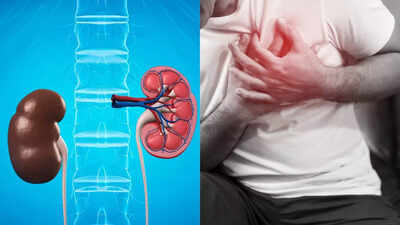ARTICLE AD BOX

Chronic kidney disease (CKD) is a condition that quietly develops over time, often without obvious symptoms in its early stages. The kidneys, which work tirelessly to filter waste and maintain balance in the body, begin to lose their efficiency, leading to a build-up of toxins and fluids.
This gradual decline affects more than just the kidneys; it can impact the heart, bones, blood, and even the nervous system. Many people may not realise the seriousness of CKD until noticeable signs like fatigue, swelling, or changes in urination appear. Understanding how the kidney functions and its connection to overall health is key to recognising the early signs and taking steps to protect the body before major complications arise.
Why chronic kidney diseases lead to widespread health problems
The kidneys are responsible for filtering about 180 litres of blood daily, helping remove toxins and maintain stable internal chemistry. When this filtering function weakens, waste materials such as urea, creatinine, and acids begin to accumulate. This build-up disrupts many body systems, leading to symptoms that may go unnoticed until the disease has significantly progressed.
Don’t Ignore Silent Kidney Damage: How to Detect Issues Before It’s Too Late | Dr Sanjeev Bagai
According to a study published in the International Journal of Nephrology and Renovascular Disease declining kidney function not only hampers waste removal but also interferes with vital hormonal and metabolic processes that maintain overall health.
The kidneys produce hormones like erythropoietin (which helps form red blood cells) and calcitriol (an active form of vitamin D that supports bone health). A drop in these hormones can lead to anaemia, weak bones, and poor mineral balance. Over time, CKD increases the workload on the heart, leading to cardiovascular complications, the leading cause of death among people with kidney disease.
Major complications of chronic kidney disease
1. Anaemia and fatigueAnaemia is one of the most common and early complications of CKD.
When the kidneys fail to produce enough erythropoietin, the bone marrow cannot make sufficient red blood cells. With fewer red blood cells to carry oxygen, tissues and muscles receive less oxygen, causing fatigue, breathlessness, dizziness, and reduced concentration.This constant state of low oxygen also increases strain on the heart, as it must pump harder to compensate for the lack of oxygen delivery. Correcting anaemia through medication, dietary adjustments, or iron and vitamin supplementation can significantly improve quality of life and slow the progression of other CKD-related problems.2. Mineral and bone disordersHealthy kidneys help maintain a balance between calcium, phosphate, and vitamin D, three elements vital for bone strength. When kidneys fail, phosphate builds up in the blood while calcium levels drop, triggering the release of parathyroid hormone (PTH). This hormonal imbalance leads to the breakdown of bone tissue, making bones brittle and more likely to fracture.People with CKD often experience joint pain, skeletal deformities, or delayed bone healing.
Over time, these imbalances can also affect blood vessels, leading to vascular calcification, a dangerous condition that contributes to heart disease. Maintaining proper mineral balance through medication and diet is an essential part of CKD management.3. Cardiovascular disease and fluid overloadThe link between kidney and heart health is strong and well-documented. As kidney function declines, the body struggles to remove excess salt and water. This results in fluid overload, which causes swelling in the legs, feet, and around the eyes.
The added fluid also raises blood pressure, forcing the heart to work harder and increasing the risk of heart failure.In advanced CKD, toxic waste accumulation and electrolyte imbalances such as high potassium levels can disrupt heart rhythm, sometimes leading to life-threatening arrhythmias. Maintaining blood pressure, limiting salt intake, and following prescribed treatments are key strategies to reduce cardiovascular strain.4. Electrolyte imbalances and metabolic acidosisThe kidneys regulate essential electrolytes like sodium, potassium, calcium, and bicarbonate. When kidney function decreases, these substances can reach harmful levels. One of the most dangerous imbalances is hyperkalaemia, excessive potassium in the blood, which can interfere with nerve and muscle function, particularly the heart.Another frequent issue is metabolic acidosis, where acid accumulates in the blood because the kidneys cannot excrete enough hydrogen ions.
This imbalance can cause muscle breakdown, bone loss, and chronic fatigue. Dietary management, medication, and regular blood tests are necessary to maintain healthy electrolyte and acid–base levels.5. High blood pressure and vascular damageHigh blood pressure is both a cause and a consequence of CKD. Damaged kidneys struggle to regulate salt and fluid levels, which increases blood pressure. In turn, this elevated pressure damages delicate blood vessels in the kidneys, worsening the condition, creating a harmful cycle.Long-term uncontrolled blood pressure can lead to stroke, heart attack, or kidney failure. Managing hypertension through medications, reducing salt, maintaining a healthy weight, and staying active is essential for protecting both heart and kidney health.6. Nerve and immune system problemsAs toxins build up in the blood, they begin to affect the nervous system. People with advanced CKD may experience tingling, numbness, or burning sensations in their hands and feet, a condition called peripheral neuropathy.
Concentration and memory problems can also occur due to toxin accumulation in the brain.In addition, CKD weakens the immune system, making individuals more vulnerable to infections. Vaccinations, good hygiene, and balanced nutrition can help strengthen immunity and reduce the risk of illness.
The importance of detecting chronic kidney disease early
One of the biggest challenges with CKD is that it often develops silently. Symptoms such as fatigue, swelling, or changes in urination may not appear until significant kidney damage has occurred.
Regular blood and urine tests can detect early warning signs, such as elevated creatinine levels or protein in the urine.Detecting CKD in its early stages allows for interventions that can slow its progression, such as controlling diabetes and hypertension, adopting a kidney-friendly diet, and avoiding medications that harm the kidneys. Early management not only preserves kidney function but also prevents complications in the heart, bones, and blood.Disclaimer: This article is for informational purposes only and should not be considered medical advice. Please consult a healthcare professional before making any changes to your diet, medication, or lifestyle.Also read | Why people with diabetes are at a higher risk of dehydration and how to prevent it

 4 hours ago
4
4 hours ago
4








 English (US) ·
English (US) ·